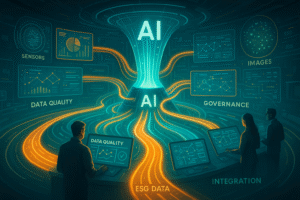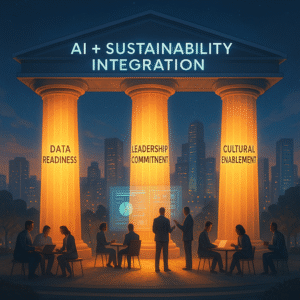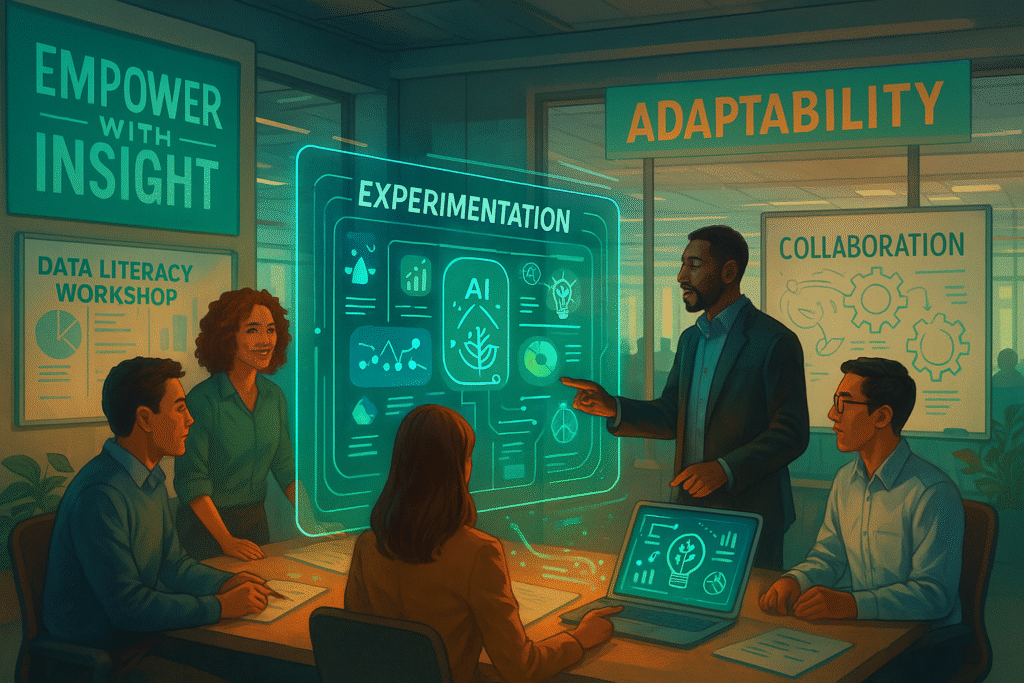Integrating Artificial Intelligence (AI) into sustainability efforts requires more than technical solutions alone. Success depends on three critical pillars: data readiness, leadership preparedness and board involvement, and a supportive organizational culture. This article explores how each of these pillars underpins effective AI and sustainability integration, and offers practical guidance for building them within your organization.
Making AI a real driver in sustainability strategy requires more than investing in technology. Without attention to data, leadership, and culture, even advanced AI initiatives often fall short of their ESG aims.
The Indispensable Pillars for Successful Integration
Research and practical experience highlight three core pillars that consistently enable effective integration of AI and sustainability.
- Data Readiness: The Foundation for Insight and Action
Reliable, well-managed data is essential for any AI application, especially in sustainability. Data readiness is both a key requirement and a common challenge.
Key elements include:
- Data Quality: Information for AI and sustainability decisions must be accurate, complete, and up to date. If not, AI outputs can be unreliable.
- Data Accessibility and Integration: ESG-related data often resides in disparate systems and formats. Breaking down these data silos and effectively integrating both structured (e.g., sensor readings, financial data) and unstructured data (e.g., reports, emails, images) is essential for providing AI models with a comprehensive view. Unified data platforms or catalogs can facilitate this.
- Data Governance: Strong data governance is essential. This involves clear policies for data creation, storage, access, and usage; defined ownership and stewardship roles; processes for tracking data lineage; ensuring security and privacy compliance; and managing data retention.
- Data Infrastructure: Organizations need the underlying technological infrastructure to support data readiness, including sufficient storage, processing power, and effective tools for data management.
- Metadata Management: Effectively managing metadata—the data about the data—is crucial for understanding, discovering, and trusting data assets.
Reliable AI insights for sustainability—such as optimizing energy use or automating ESG reporting—depend on well-managed, accessible data. Achieving genuine data readiness also necessitates cultural and process changes, fostering a data-centric mindset where data quality is valued and governance is adhered to. The increasing reliance on unstructured data for ESG analysis adds another layer of complexity, requiring competencies in managing and extracting value from diverse information sources.
- Leadership Preparedness and Board Involvement: Driving Transformation from the Top
 The successful integration of AI and sustainability is a significant strategic undertaking that demands strong, informed leadership and engaged oversight from the board of directors. Without commitment from the top, initiatives often falter.
The successful integration of AI and sustainability is a significant strategic undertaking that demands strong, informed leadership and engaged oversight from the board of directors. Without commitment from the top, initiatives often falter.
- Leadership Preparedness: Effective leadership involves a strategic vision that views AI+Sustainability as a driver of long-term value, active executive sponsorship, willingness to allocate necessary resources, and acumen in managing AI-associated risks (ethical, bias, privacy). Leaders also play a critical role in fostering an enabling culture that embraces data-driven decision-making and innovation.
- Board Involvement: The board’s role is increasingly critical in overseeing AI governance, ensuring alignment with corporate strategy and stakeholder interests, and holding management accountable for responsible AI deployment and sustainability goals. Direct CEO oversight of AI governance, for instance, correlates positively with achieving bottom-line impact from Generative AI.
Integrating AI and sustainability is a complex transformation. Without decisive, informed leadership providing strategic direction and ensuring robust governance, initiatives are prone to failure. A potential challenge lies in a possible disconnect between expressed commitment and actual preparedness regarding complexities and risks, highlighting a need for targeted education for executives and board members. The rising expectation for direct board oversight of AI also introduces new dimensions to corporate governance, requiring boards to develop new competencies.
- Cultivating a Supportive Organizational Culture and Practical Strategies
Building data readiness and ensuring leadership preparedness require deliberate, practical strategies. An organizational culture that values data-driven decision-making, encourages experimentation, fosters cross-functional collaboration, and is open to change is essential for successful AI adoption.
- Cultivating Data Readiness: This involves adopting a phased, pragmatic approach to data initiatives, investing in data quality tools and processes, developing a clear data strategy, establishing strong governance, modernizing infrastructure, and fostering data literacy across the organization.
- Cultivating Leadership Preparedness and Board Involvement: Strategies include assessing and aligning leadership understanding, providing targeted education on AI and sustainability, integrating these topics into formal strategic planning, defining clear roles and accountability, broadening performance metrics beyond short-term financials, and ensuring diverse perspectives in decision-making.
When these critical enablers—data readiness, leadership preparedness, and a supportive culture—are cultivated in concert, they create a powerful foundation. Organizations strong in these areas are significantly better positioned to develop effective strategies, secure resources, navigate implementation complexities, manage risks responsibly, and ultimately achieve higher levels of AI maturity and more substantial sustainability benefits. This cultivation requires a coordinated, holistic effort, recognizing the interdependence of these pillars. Success often lies in pragmatic approaches, such as building upon existing processes and embedding governance into existing workflows.
Key Takeaways for Leaders
The foundational elements for enabling successful AI and sustainability integration offer clear guidance:
- Data readiness is non-negotiable: High-quality, accessible, and well-governed data forms the absolute bedrock for any effective AI-driven sustainability initiative.
- Leadership commitment is paramount: Visible, informed, and active support from the C-suite and board is essential to drive strategy, allocate resources, and oversee responsible implementation.
- Culture is a key enabler: A supportive organizational culture that embraces data, innovation, and collaboration is crucial for overcoming resistance and fostering widespread adoption.
- Holistic development is required: These pillars are interconnected and must be developed concurrently through practical, integrated strategies rather than isolated efforts.
Conclusion: Building the Foundation for Lasting Impact

Enabling the successful integration of AI and sustainability is not merely about deploying new technologies; it’s about building a robust foundation within the organization. As underscored by extensive research, data readiness, leadership preparedness, and a conducive organizational culture are the indispensable pillars that support this transformative journey.
By building these capabilities, organizations position themselves to adapt and innovate as technology and sustainability become more connected. By focusing on these fundamentals, businesses can use AI to deliver long-term ESG results.
In the next article, we’ll look at common challenges and practical ways to overcome them.
References
- Pluralsight – A Leader’s Guide for Building a Modern Data Strategy for AI
https://www.pluralsight.com/resources/blog/ai-and-data/leaders-guide-data-strategy-for-AI
- PMI – Sustainability in the Age of AI: The Integration Imperative
https://www.pmi.org/-/media/pmi/documents/public/pdf/learning/thought-leadership/brightlinesustainabilityai20250403.pdf
- Research ESG Global – Overcoming the Data Readiness Hurdle
https://research.esg-global.com/chapters/515202010/OvercomingtheDataRea
- Accenture – The Art of AI Maturity: Advancing from Practice to Performance
https://www.accenture.com/ca-en/insights/artificial-intelligence/ai-maturity-and-transformation
- Software Improvement Group – AI Readiness Guide for Organizations
https://www.softwareimprovementgroup.com/wp-content/uploads/ai-readiness-guide-download.pdf
About the Author:
Merv Wyeth, Sustainability Community of Action (SCoA) Lead
Sam Leung, Sustainability Community of Action (SCoA) Member


